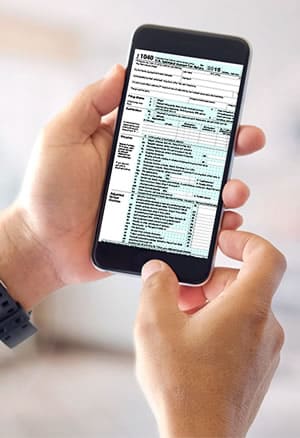First Time Filing: What Tax Documents Should You Have

The first time you pay your taxes may feel daunting. Often taxpayers worry that they don't have the right paperwork or that they're completing their return incorrectly. The last thing you want is to get a letter from the IRS after making a mistake. We have prepared the following resources to help first time filers prepare their taxes correctly.
Before you begin, it's important to gather all the materials you believe you will need. This way, you won't be forced to turn filing into a multi-day process while you scramble to find the forms you need. Keeping all of your paperwork in one place makes it easier to prepare your return in one sitting and forget about filing your taxes again until next spring. The following are documents you will need to prepare your return.
Bank and Personal Information
The personal information section typically requires fewer documents, however, there are a few things you should consider looking up in advance. Before you get started on your return, you'll need your social security number, the social security number of your spouse and any dependents that you're claiming. You will also need everyone's birth dates. It is also good practice to have your bank's routing number and your account number available. If the IRS ends up owing you a refund, you can receive it quicker by directing them to deposit it directly into your account.
Annual Income Reporting Forms
The filing of a tax return is a way for the federal government to figure out how much money you made last year and how much you owe in taxes. If you maintained a full-time job and your employer pulls taxes from your paycheck automatically, then you should receive a W-2 form. If you maintained more than one job throughout the calendar year you may have multiple W-2s.
If you instead worked as an independent contractor or sole proprietor, then you should receive 1099 forms from any US-based company who paid you at least $600 over the calendar year. Vendors that contract your services won't withhold taxes, but you still owe income tax on this income to the federal and respective state governments. One option for reducing the amount you pay at the end of the year is to write quarterly estimated checks to the IRS.
While these two tax forms may cover most wages, there are a few other forms of income which, if you have received, should also be reported. These may include:
- Investment income (dividends and capital gains)
- Unemployment income
- Retirement income
- Rental property income
- Miscellaneous income (like lottery winnings or cash prizes)
For first-time filers, reporting their income may be the most time consuming part of the tax filing process but if you collect all your documentation in advance it can help to speed up this process.
Tax Credits for Investments and Planning
Are you a student? Did you contribute to a retirement plan? Did you pay out of pocket for a health insurance plan? These are just a few questions that determine what tax credits you may qualify for.
For example, the federal government offers tax credits for people who buy houses and for those who invest in green energy for their homes. There are education credits as well as credits for qualifying taxpayers who are required to pay for their own health insurance. It's important to review the potential tax credits you may qualify for and collect proper documentation in order to minimize your tax liability. When first-time filers file with E-file.com, our software helps to identify situations which may make them eligible for a valuable credit.
Job and Child-Related Receipts
Throughout the year, you may have paid to advance your career, promote yourself as an independent contractor, or take care of your child. Many of these work related events are tax-deductible.
If you took a business class this year to improve how you run your business or to try and land a promotion, then you should save your tuition receipts and report them on your taxes. Other expenses like child care, adoption costs, qualified business expenses, and moving expenses can be submitted to the IRS as tax deductibles.
However, you don't want to make the mistake of over-deducting your entire bill if it only partially qualifies. For example, if you have an office for a home-based business, you can deduct part of your home's mortgage or rent as a business expense, but you need to calculate the exact amount of space you use for work and it must be entirely used for work.
The final documents you may want to assemble before starting your return are miscellaneous deduction forms. These are expenses that aren't directly related to your job, children , or home, but can still merit a tax deduction. A few examples of these are:
- Charitable donations
- Casualty or theft losses
- Medical expenses
As long as you keep track of these documents throughout the year, you should be able to file accurately, easily and in a relatively short period of time. However, if you find you are missing something important you can always check out our article on missing tax information.
